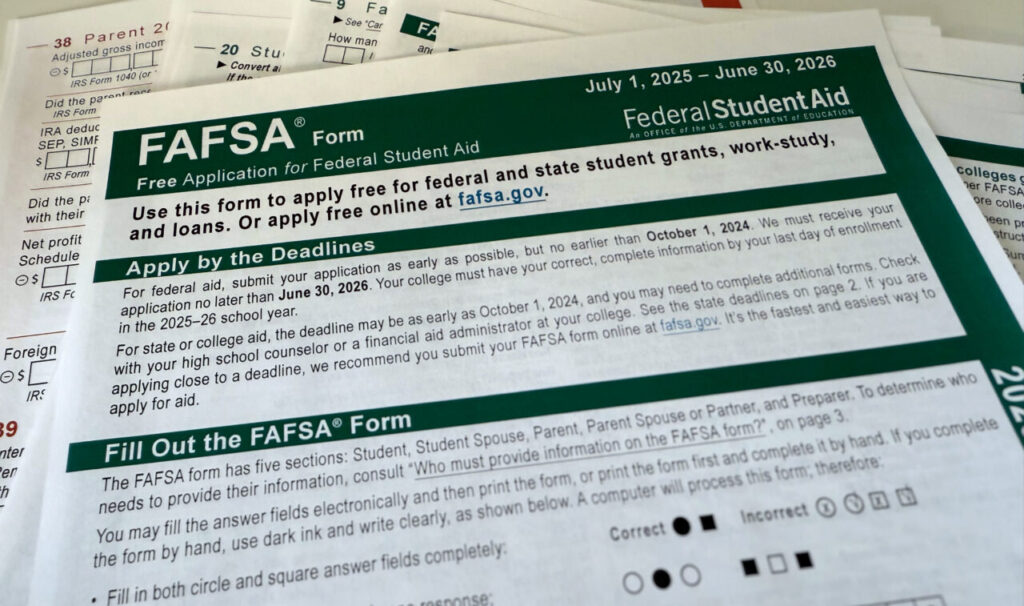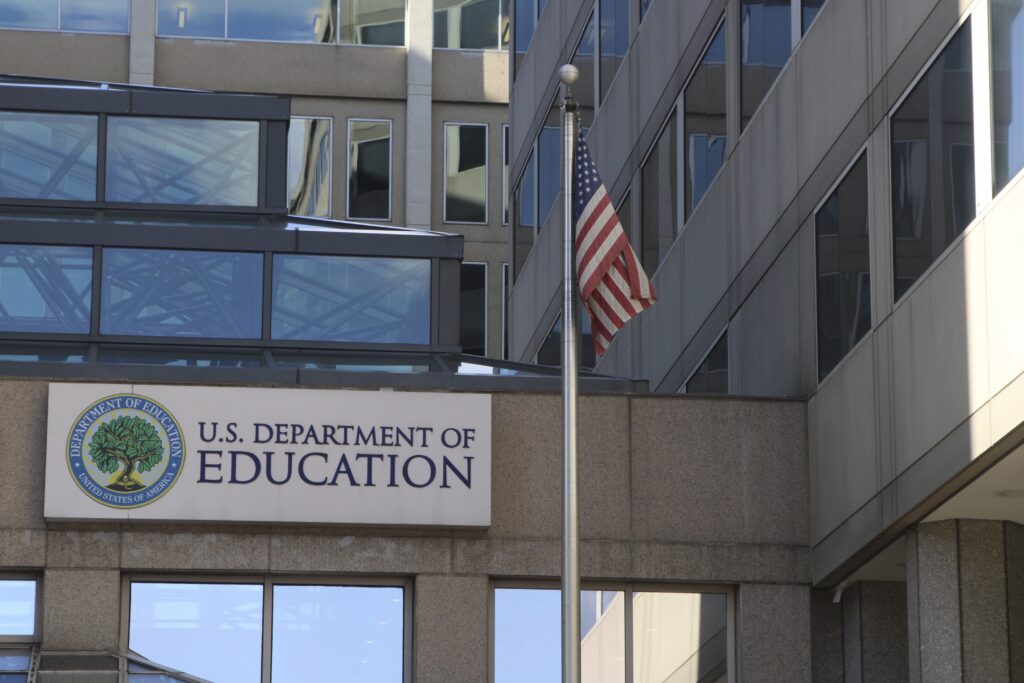
The 2025-26 FAFSA form.
Credit: Andrew Reed
Top Takeaways
- California’s community colleges have dispersed $14 million and likely much more in financial aid to fraudsters.
- The U.S. Department of Education says colleges must verify the identities of more students this summer. In the fall, it plans to launch permanent screening.
- Colleges worry that the new measures could burden students too much and prevent some from enrolling.
California colleges are worried that new federal measures seeking to crack down on financial aid fraud, which has stolen millions in grants, could result in the unintended consequence of fewer legitimate students enrolling.
At California’s community colleges, where the fraud has been most pronounced in the state, financial aid officials hope the new steps will strike a balance between deterring bad actors while also minimizing the burden on real students. Some students may find taking extra steps to prove their identity to be an extra barrier to enrolling, possibly scaring them off, administrators say.
“How do we do fraud mitigation, but also still have students apply? The more barriers, the harder we make it to get in our systems, the less people will come,” said Tina Vasconcellos, associate vice chancellor of educational services at the Peralta Community College District. “It’s great the federal government wants to help us and cut down on fraud, but at the same time, is it going to create another hoop for our students to jump through to get to us in the first place?”
The U.S. Department of Education announced last month it will roll out new ways to verify the identities of students who apply for aid. Most of the fraud has tapped federal aid, in the form of Pell Grants intended for low-income students, but some state and local aid has also been stolen in California and elsewhere.
The federal department said it would require colleges this summer to verify the identities of additional first-time applicants. That will apply to about 125,000 students in total nationwide, but the department didn’t say how that will be split among the colleges. To get verified, students will have to show government-issued identification such as a passport or driver’s license. If the college determines that a student is unable to show the identification in person, the student can be given the option to do so on a video call.
“Although we recognize that these verification selections could be challenging for some institutions and students, it is a critically important and targeted step toward preventing fraud,” the department wrote in an announcement.
The additional verification for the summer term is only a temporary solution before the department implements a permanent screening process for every financial aid applicant for the upcoming fall term.
Officials have not said what that process will entail in the fall. Among the possibilities, college officials speculate that requiring more students to come in person to prove they are real, which could be potentially challenging for students who live far away and take entire course loads online.
Community colleges have been plagued by financial aid scammers who target those institutions because they are open-access and offer many classes fully online. That makes it much easier to enroll in classes online and be eligible for aid. At least $14 million in aid, and likely much more, has been dispersed to fraudsters at California community colleges since 2021.
It’s also easier to defraud community colleges than more expensive universities because tuition is so low or otherwise covered, and much of the grants go directly to students for living costs, rather than to the colleges for tuition.
“We don’t know what the plan is for the fall,” said Jill Desjean, the director of policy analysis at the National Association of Student Financial Aid Administrators. Ideally, Desjean said, the process would be automated so that additional steps aren’t required of students or staff. “There’s just a limit to what the schools can do.”
Pretending to be legitimate students, fraudsters start by applying for admission online. Some of them are caught there, but others successfully get admitted and enroll in classes. At that point, they can request financial aid, which, if they’re successful, gets distributed to personal bank accounts via direct deposit.
Beyond stealing aid, the scams have additional consequences for real students. Since each course has a finite number of seats, genuine students are sometimes left on waiting lists and can’t enroll because fraudsters are taking up the available seats.
In a statement when the new measures were announced, U.S. Secretary of Education Linda McMahon said the department “has a responsibility to act” because fraud is “taking aid away from eligible students, disrupting the operations of colleges, and ripping off taxpayers.”
Jasmine Ruys, vice president of student services at College of the Canyons in Santa Clarita, acknowledged that “it’s our job to make sure that fraud is not happening and that we’re good stewards of taxpayer money.”
She added, though, that the college strives to balance that responsibility with not asking too much of students.
“Some students work during the day, so they might have to take time off work to be able to come over to us to verify,” Ruys added. “So we try really hard not to put any kind of barriers up for a student.”
Even being asked to upload additional documents online could be difficult for some students, said Vasconcellos of the Peralta district, which serves Oakland and the rest of northern Alameda County.
“We still have a digital divide. There are students within our community who have less access to all aspects of technology,” she said. “A lot of our students are actually still using their phones to take their classes. So what I’d be concerned about is if the technology on the receiving end isn’t working and if it’s not easy to upload your ID, or whatever it is that they’re asking for, it’s going to potentially be a barrier.”
Vasconcellos and Ruys both said they’re hopeful that whatever the department implements this fall will be something that doesn’t require much extra from students.
One possible solution, Ruys said, would be to add something at the beginning of the Free Application for Federal Student Aid (FAFSA), so the verification happens quickly rather than when students are getting ready to start their classes. That could be something similar to ID.me, an online identity verification platform already being used by many community colleges.
It’s not clear, however, whether the department is considering that option.
“Whatever it is, we’re going to abide by all laws,” Ruys said. “We just hope that it doesn’t limit our students from being able to enroll and attend college.”


